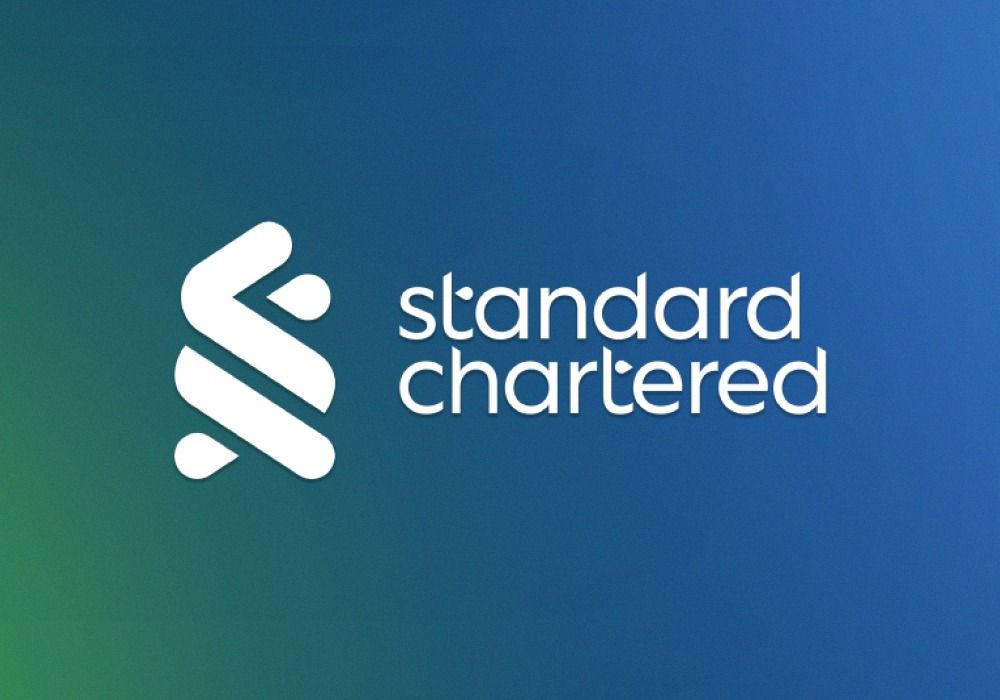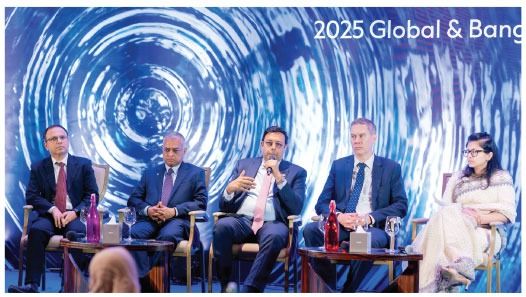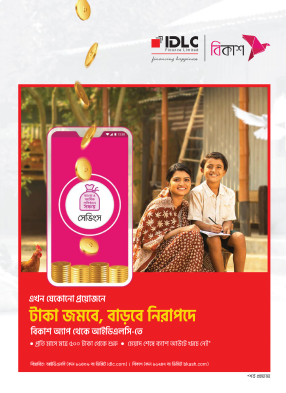- info@ficci.org.bd
- |
- +880248814801, +880248814802
- Contact Us
- |
- Become a Member
- |
- |
- |
- |
- |

Weiji is a Chinese word composed of two characters - one meaning challenge, the other opportunity. It is a marriage of two divergent forces which can combine to form a force that is insurmountable, if the elements allow. A conceptual metaphor, it captures the essence of Bangladesh's current reality: a moment of global disruption that carries within it the seeds of transformative potential. As the world grapples with volatility and change, Bangladesh stands at a pivotal moment. This is Bangladesh's moment of weiji unfolding, where global volatility and internal resilience could unlock an era of resilience and growth - only if the country can execute and commit to needed reforms and consistency in policy framework application.
Today's global economic landscape is characterized by profound uncertainty and structural shifts-often described as "uncertainty on steroids." Yet, amid these global disruptions lies unprecedented opportunity. Bangladesh finds itself at a crucial inflection point, reminiscent of the position many Asian Tigers occupied decades ago. The risks are present, but the potential for transformation through resilience, innovation, and strategic reform remains equally compelling.

Sidebar: Global Challenges Catalysing Local Opportunities
Shifting Economic Dynamics
The US dollar's recent weakening - driven by easing inflation, rising fiscal risks, uncertainties around U.S tariff and potential erosion of central bank independence - has reduced its global dominance, giving emerging markets greater autonomy to trade based on intrinsic economic strengths. However, uncertainty persists due to US monetary policy debates and the high debt burden, complicating access to dollar-based financing for emerging markets.
Europe, meanwhile, faces below-par growth due to lagging investments and shifting manufacturing bases. Yet, potential fiscal stimulus in Germany, aimed at infrastructure and defence spending, could significantly boost
China's economic situation remains fragile, marked by low consumer sentiment and significant real estate sector issues. However, this scenario offers Asia, including Bangladesh, opportunities for monetary easing amid China's deflationary pressures.
Capitalizing on Trade Fragmentation
Global trade routes and supply chains are evolving rapidly, fueled by shifts in US trade policies. Countries like Vietnam and Mexico have successfully harnessed these changes, and Bangladesh is strategically positioned to follow suit. Bangladesh holds competitive advantages over regional peers, and increasing interest from countries like Japan, Korea, and China underscores its potential as an attractive investment destination. To seize these opportunities, strategic policy adjustments, infrastructure development, and proactive reforms are essential.
Sidebar: Bangladesh's Enduring Strengths & Stabilization
Structural Strengths
Bangladesh's fundamentals remain robust. The country's demographic dividend-a young, ambitious population
-is poised to drive economic growth for the next quarter-century. Other key strengths include:
. Strong domestic consumption
. Growing remittance inflows, bolstered by governmental incentives
.Resilient export recovery
. Inclusive and expansive digital financial services
. A competitive and resilient manufacturing sector, particularly in garments
Recent Economic Stabilization
Bangladesh demonstrates clear signs of economic stabilization:
. GDP growth has rebounded from 2% in Q1- FY25 to approximately 4.5% in Q2-FY25
. Inflation, previously around 10%, is forecasted to drop to around 7.5% next year and below 6.5% by FY26
. Foreign exchange reserves have stabilized, expected to reach around $25 billion
. The revival of the interbank FX market enhances financial transparency
. A substantial reduction in the current account deficit to about 0.5% of GDP, driven by robust remittances and resilience in exports
. Recent IMF support totalling approximately $1.3 billion underscores unlocks additional multilateral funding

Callout: Speaker highlights
"The government remains fully committed to reform efforts aimed at improving the ease of doing business and attracting foreign direct investment. Moving forward, we must draw on collective expertise and align policy support to navigate global market complexities and drive sustainable, inclusive growth for Bangladesh."
- Lutfey Siddiqi, Special Envoy on International Affairs to the Chief Adviser
"Although short-term indicators point to a potential turning point, our confidence is rooted in the strength of long-term fundamentals. We believe the current stabilisation presents an opportunity for sustained growth - but achieving this will depend on coordinated policy measures, ongoing external support, and structural reforms to revitalize growth drivers amid persistent global geopolitical uncertainties."
- Naser Ezaz Bijoy, CEO, Standard Chartered Bangladesh
'Bangladesh is poised at the edge of transformative growth, ready to become a major global economic contributor. In order to better navigate today's volatile global environment, it is critical that we embed sound risk management practices to manage foreign exchange and interest rate uncertainties.
- Sabah Saleheen Azim, Head of Markets and Corporate Sales, Standard Chartered Bangladesh

Key Insights
Q1: How is the global economic landscape evolving, particularly regarding currency trends?
A: The global economic landscape is experiencing significant shifts, notably characterized by a weakening US dollar due to subdued inflation and rising fiscal concerns. The movements in the US dollar and US bond markets recently have sparked discussions about their potential diminishing economic dominance. In contrast, currencies such as the euro and the British pound have seen appreciable gains driven by improved macroeconomic indicators, stronger regional economic momentum weaker dollar and hawkish tilt by the European central bank.
Q2: What challenges and opportunities do the current foreign exchange (FX) environment pose for Bangladesh?
A: The evolving global FX landscape presents dual scenarios for Bangladesh. On one side, a weakening US dollar potentially reduces the nation's import expenses and external debt repayment burdens. Conversely, the previous experience with a depreciating local currency (taka) underscores potential vulnerabilities, including higher import costs and inflationary pressures and thereby, a greater need to embrace risk management best practices. The recent adoption of a flexible exchange rate policy and the revival of the interbank market are significant advancements toward greater economic resilience and stability.
Q3: How has Bangladesh managed inflation amid ongoing global economic volatility?
A: Bangladesh has proactively managed inflationary pressures despite global volatility, with inflation previously averaging around 10% annually. Recent data indicate inflation is easing, currently around 8.5%. Monetary policy measures including revision of policy rates upward and tightening of money market liquidity windows have significantly contributed to this stabilization. Looking forward, inflation rates are projected to decline further, reaching below 7% by the end of the upcoming fiscal year.
Q4: What inherent strengths does Bangladesh possess that help it navigate global uncertainties?
A: Bangladesh benefits from several structural strengths that position it favourably amid global uncertainties. These include a large and youthful demographic, robust domestic consumption patterns, consistently strong remittance inflows, resilient export sectors, and competitive wage levels compared to regional competitors. Additionally, the nation boasts one of the most an inclusive and advanced digital financial infrastructure, enhancing economic flexibility and ability to grasp momentum.

Q5: What does the future economic growth trajectory look like for Bangladesh?
A: Bangladesh's economy has rebounded after facing growth setbacks during recent disruptions, with current growth rates stabilizing around 4.5%. Economic recovery is forecasted to continue, with growth expected to reach approximately 5% in the upcoming fiscal year. This rebound is primarily fueled by falling inflation rates, strengthening domestic consumer spending and recovery of external sector. However, private sector investment remains cautious.
Q6: How has Bangladesh's external account evolved, and what further improvements are anticipated?
A: Bangladesh's external financial position has significantly improved recently. The current account deficit, previously peaking around 4% of GDP, has now narrowed to approximately 0.5% due to increased remittance inflows and stabilizing trade balances. Foreign exchange reserves have shown encouraging signs of stabilization, projected soon to reach about $25 billion, thus improving the overall external financial stability and investor confidence.
Q7: What key structural reforms is Bangladesh implementing to sustain economic stability?
A: Bangladesh is advancing crucial structural reforms aimed at bolstering long-term economic stability. Key initiatives include enhancing fiscal revenue collection, currently low at about 7% of GDP, and tackling high levels of non-performing loans, around 24% in the banking sector. Additionally, policy efforts are being made to rationalize subsidies and liberalization of interest rates & FX rates to align more closely with market conditions. A comprehensive banking sector reform bill is also underway to strengthen financial governance and stability.
Q8: How are global trade dynamics creating economic opportunities for Bangladesh?
A: Shifts in global trade dynamics, notably those influenced by tariff adjustments and trade reorientation away from traditional manufacturing hubs, present substantial opportunities for Bangladesh. Countries across Asia and beyond, such as Japan, Korea, and China, increasingly consider Bangladesh an attractive alternative for manufacturing investments. To fully leverage these opportunities, Bangladesh needs to strategically adjust policies, enhance infrastructure, and actively pursue beneficial trade agreements. Competitors like Vietnam have several such trade agreements in place with multiple countries which, in turn, ensure that trade flows are stable and less susceptible to global shocks. This is one the major objectives Bangladesh should have in the upcoming months, years.
Q9: What impact have recent global commodity price fluctuations, particularly oil, had on economic conditions?
A: Recent volatility in global commodity markets, especially oil, highlights ongoing vulnerabilities in the global economic system. Rapid fluctuations in oil prices-sharp increases followed by swift declines due to geopolitical tensions-underscore the importance of prudent fiscal management, risk management through commodity hedging and targeted monetary policies. In fact the most recent geopolitical episode in the Middle East when oil prices rose by >15% in one day and then fell by the same amount in one evening illustrate the increasing need to find ways to smoothen out ripples and repercussions of global events
Q10: What are the critical insights regarding Bangladesh's economic outlook amid current global uncertainties?
A: Bangladesh stands at a crucial inflection point characterized by both considerable risks and substantial opportunities in the current global economic climate. Despite recent economic and political disruptions, the country has emerged positively relative to potential scenarios. Ongoing strategic reforms, effective risk management, transparent economic policies, and a clear commitment to sustainable and inclusive growth remain essential for maximizing Bangladesh's long-term economic potential.





